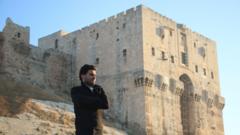Despite joyful family gatherings in Aleppo following a rebel takeover, residents express anxiety over renewed warfare, government retribution, and the uncertain fate of minorities under their new rulers.
Aleppo's Uncertain Future: Reunions Amidst Tensions and Fear of Warfare

Aleppo's Uncertain Future: Reunions Amidst Tensions and Fear of Warfare
As Aleppo emerges from recent rebel offensives, families reunite amidst concerns over escalating violence and shifting power dynamics.
In a touching moment, Abdulkafi, an English teacher from Aleppo, reunited with his elderly father for the first time in years amidst a delicate shift in power within the city. The meeting followed a significant offensive by the rebel group Hayat Tahrir al-Sham (HTS), which has recently seized control of northern Aleppo from government forces. “He is 85, an old man. He never dreamed he would see me again before he died,” Abdulkafi shared, as a video captured the emotional embrace between father and son.
While there are reports of improved living conditions, including better access to electricity and water, many interviewees conveyed a profound unease about the potential for renewed conflict. With tens of thousands displaced due to the violence, some residents requested anonymity due to safety concerns, and independent reporting remains challenging in Syria. The ongoing threat of airstrikes from government forces has left locals on edge, with one man expressing a halt on family outings out of fear for their safety. “We’re living in complete apprehension,” he said, recalling the horrors of past bombardments.
Aleppo previously experienced a shift in control during the ongoing civil war, having been recovered by Syrian government forces with Russian support in 2016. The city, which served as Syria’s commercial center before long-term conflict erupted, has since seen claims of reconstruction by the regime contradicted by numerous allegations of human rights violations.
While Abdulkafi’s family reunion was heartwarming, he noted the fear among some kin to be seen with him due to possible repercussions should regime forces reclaim Aleppo. "Nineteen Eighty-Four is applied in Aleppo," he remarked, likening the atmosphere to Orwell’s depiction of totalitarianism, with pervasive government images shaping daily life.
Initially affiliated with al-Qaeda, HTS claims to have moderated its stance since its inception. However, human rights groups warn of its alleged mistreatment of dissenting journalists and civilians. A woman, reflecting the community sentiment, spoke of confusion and fear following the rebel ascension, recognizing a cautious calm yet sensing that everyone felt a nagging unease.
Despite encountering armed HTS members during outings, some residents expressed relief, believing them to be an improvement over the regime. “We are grateful that these armed groups have taken over. They are better than the government,” a man named Mohammad asserted. Yet, the overarching concern remained: the fear of food shortages and relentless bombardment from Russian and Syrian forces.
George Meneshian, a political analyst connected to Armenians in Aleppo, relayed that local Christians have not reported issues since HTS took over, emphasizing promises of protection made by the group. Nevertheless, a deep-rooted skepticism persists regarding HTS's commitments, especially considering the historical context of jihadist groups towards minorities.
Amidst the complexities of shifting allegiances and fears of repercussions, Abdulkafi concluded that while he personally disagrees with HTS, he believes the group will extend flexibility towards various sects in hopes of gaining international acceptance. As Aleppo navigates these tumultuous changes, residents remain in a precarious balance between hope and trepidation regarding their future.



















